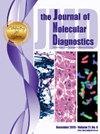Haplotype-Aware Detection of SERPINA1 Variants by Nanopore Sequencing
IF 3.4
3区 医学
Q1 PATHOLOGY
引用次数: 0
Abstract
α-1 Antitrypsin (AAT) is an acute-phase reactant with immunomodulatory properties that mainly inhibits neutrophil elastase. Low serum levels cause AAT deficiency (AATD), an underdiagnosed condition that predisposes to pulmonary and hepatic diseases. The SERPINA1 gene, which encodes AAT, contains >500 variants. PI∗Z and PI∗S alleles are the most diagnosed causes of AATD, but the role of the SERPINA1 haplotypes in AAT function remains unknown. SERPINA1 gene was PCR amplified from 94 patients with asthma, using primers with tails for indexing. Sequencing libraries were loaded into a MinION-Mk1C, and MinKNOW was used for basecalling and demultiplexing. Nanofilt and Minimap2 were used for filtering and mapping/alignment. Variant calling/phasing were performed with PEPPER-Margin-DeepVariant. SERPINA1 gene was 100% covered for all samples, with a minimum sequencing depth of 500×. A total of 75 single-nucleotide variants (SNVs) and 4 insertions/deletions were detected, with 45 and 2 of them highly polymorphic (minor allele frequency >0.1), respectively. Nine of the SNVs showed differences in allele frequencies when compared with the overall Spanish population. More than 90% of heterozygous SNVs were phased, yielding 91 and 58 different haplotypes for each SERPINA1 amplified region. Haplotype-based linkage disequilibrium analysis suggests that a recombination hotspot could generate variation in the SERPINA1 gene. The proposed workflow enables haplotype-aware genotyping of the SERPINA1 gene by nanopore sequencing, which will allow the development of novel AATD diagnostic strategies.
利用纳米孔测序技术检测 SERPINA1 变异的单倍型。
α-1抗胰蛋白酶(AAT)是一种急性期反应物,具有免疫调节特性,主要抑制中性粒细胞弹性蛋白酶。血清中 AAT 含量低会导致 AAT 缺乏症(AATD),这种疾病诊断不足,容易引发肺病和肝病。编码 AAT 的 SERPINA1 基因含有超过 500 个变体。PI∗Z和PI∗S等位基因是导致AATD的最主要原因,但SERPINA1单倍型在AAT功能中的作用仍不清楚。使用带尾引物对 94 名哮喘患者的 SERPINA1 基因进行 PCR 扩增。测序文库被载入 MinION-Mk1C,MinKNOW 被用于基线分选和解复用。Nanofilt 和 Minimap2 用于过滤和映射/配准。使用 PEPPER-Margin-DeepVariant 进行变异调用/分期。所有样本的 SERPINA1 基因覆盖率均为 100%,最小测序深度为 500×。共检测到 75 个单核苷酸变异(SNV)和 4 个插入/缺失,其中 45 个和 2 个分别具有高度多态性(小等位基因频率大于 0.1)。其中 9 个 SNV 的等位基因频率与西班牙总体人群相比存在差异。超过90%的杂合SNV是分阶段的,每个SERPINA1扩增区域产生了91个和58个不同的单倍型。基于单倍型的连锁不平衡分析表明,重组热点可能导致 SERPINA1 基因的变异。所提出的工作流程可通过纳米孔测序对 SERPINA1 基因进行单倍型感知基因分型,从而开发出新型的 AATD 诊断策略。
本文章由计算机程序翻译,如有差异,请以英文原文为准。
求助全文
约1分钟内获得全文
求助全文
来源期刊
CiteScore
8.10
自引率
2.40%
发文量
143
审稿时长
43 days
期刊介绍:
The Journal of Molecular Diagnostics, the official publication of the Association for Molecular Pathology (AMP), co-owned by the American Society for Investigative Pathology (ASIP), seeks to publish high quality original papers on scientific advances in the translation and validation of molecular discoveries in medicine into the clinical diagnostic setting, and the description and application of technological advances in the field of molecular diagnostic medicine. The editors welcome for review articles that contain: novel discoveries or clinicopathologic correlations including studies in oncology, infectious diseases, inherited diseases, predisposition to disease, clinical informatics, or the description of polymorphisms linked to disease states or normal variations; the application of diagnostic methodologies in clinical trials; or the development of new or improved molecular methods which may be applied to diagnosis or monitoring of disease or disease predisposition.

 求助内容:
求助内容: 应助结果提醒方式:
应助结果提醒方式:


